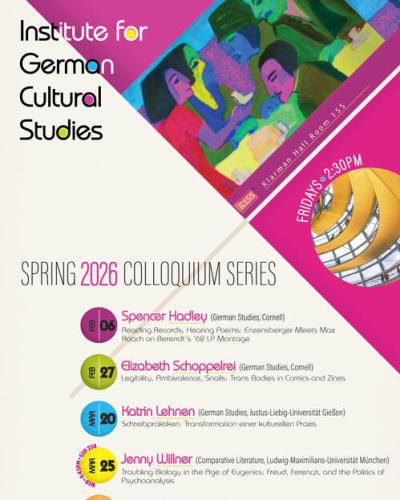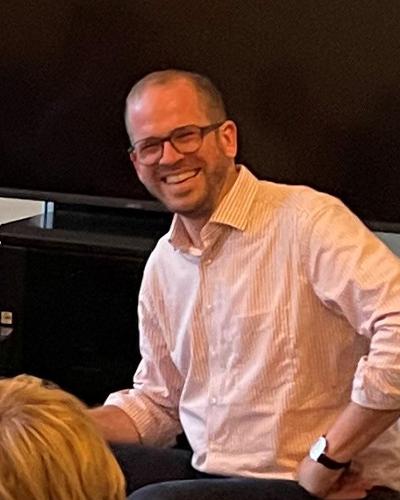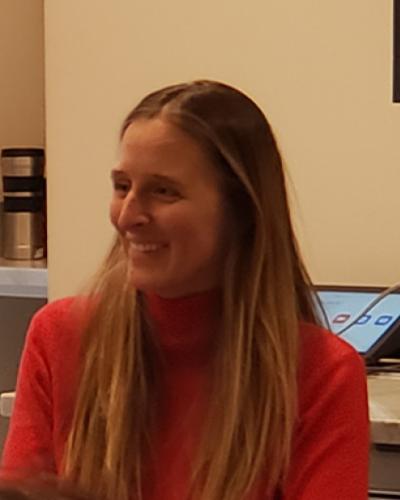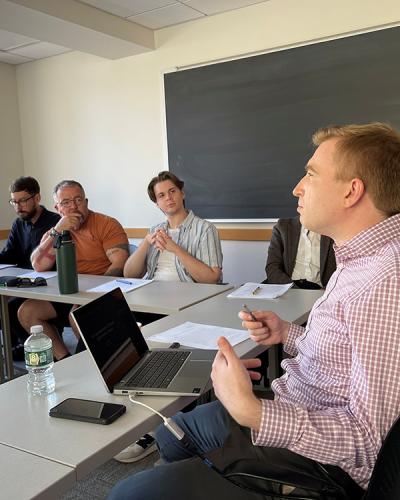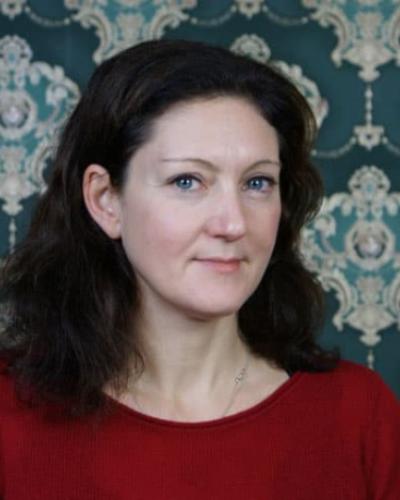Masterclass
On the afternoon of February 28th, the German writer-in-residence Rebekka Kricheldorf gave a masterclass focusing on her new play Testosterone, which was concurrently having its English-translation première at the Cherry Arts Space in Ithaca. Conducted in German, the masterclass took on the form of a seminar, which allowed for intensive group discussion. All participants had received the German original and the English translation of her play, as well as a Grimm Brothers’ fairy tale titled “The Story of the Youth Who Went Forth to Learn What Fear Was,” which served as a template for the play. The oddities and nuances of this fairy tale ended up as one of the main foci of the seminar. The narrative follows a young man’s attempt to overcome his inability to feel fear by seeking out dangerous situations. As Kricheldorf began to unpack the reasons for her long-standing fascination with the play, a few main themes crystalized: the anti-psychological character of fairy tale figures, the fact that feeling fear is referred to by the young boy as an “art”, the way the tale can be seen to prefigure a kind of toxic masculinity, and whether or not the inability to feel fear can be perceived as socially deficient or advantageous.
The discussion also revolved around Kricheldorf’s writing practices, touching on questions of method and composition. Many of Kricheldorf’s plays take their impetus from fairy tales or other stories whose main figures resist a kind of contemporary psychologizing. In their anti-realism, Kricheldorf believes, they can reveal telling aspects of our current situation. The discussion productively focused on the difficulty of rendering specific German terms in English, especially the German verb “gruseln” that occurs repeatedly in the fairy tale and whose translation might lie somewhere between “feeling fear/afraid” and “having the creeps.” The in-betweenness of this term––which does not directly refer to fear or its object yet is not completely dissociated from it––became a productive touchstone in the conversation not only with respect to fear and its social function, but also with respect to translation, different cultural audiences and the challenge of accurately expressing foundational emotions through language. It was only fitting that, as Kricheldorf noted, the Grimm Brothers were responsible for the word coming into common usage in German. (Daniel Binswanger Friedman)
Testosterone (The Cherry Artspace, Ithaca)
February 21-March 3, 2019
Testosterone means many things. Perhaps most obviously it signifies the male sex hormone, yet from a cultural standpoint the word has come to enjoy a broader semantic range and is often associated with expressions of (toxic) masculinity. This is the most immediate meaning that is evoked by Testosterone, Rebekka Kricheldorf’s play, which premiered in a new English translation at Ithaca’s Cherry Artspace, February 21 to March 3.
The play was commissioned in 2012 by the Kassel State Theater as the second installation of a trilogy inspired by the fairy tales of the Brothers Grimm. As Kricheldorf explained in a conversation with faculty and graduate students, the story that inspired her play, “The Boy Who Went Forth to Learn What Fear Was,” does not so much dwell on the “fairy” dimension of folk tales. Magic powers, talking animals, spirits and ghosts here possess only an ancillary function, for the quest of the main character involves coping with “fear.” The ability to fear and to struggle with finitude, in Kricheldorf interpretation of the Grimm tale, involves the polarized dichotomy between a “good” and a “bad” son. The former, the embodiment of a Rambo fanatic, is unable to fear, while the latter is the opposite stereotype: a caring and prudent doctor, but also (and primarily) a coward. The opposite forces of human nature symbolized by the siblings--strength and weakness, along with their caricatures: the macho and the sissy, the prostitute and the virgin––remain polarized in the play until the moment of trial, brought about by the sudden irruption of the unpredictable world known here as the “bad neighborhood” into the domestic space. The peaceful life of the good son, along with his “good wife” and their “good patriarch” is forcibly rearranged as a result. This starts a chain reaction in which characters trade roles and values in a tantalizing game of exchanges that in the Ithaca production took place in a suffocating domestic space symbolized by a carpeted box hyper-protected by grotesque surveillance systems. The return of a character in the form of a ghost introduced a rich array of comic elements that played against dramatic conventions. (Mariaenrica Giannuzzi)
Workshop on Translation
On March 4th, 2019, the IGCS writer-in-residence Rebekka Kricheldorf held a workshop following the English première at Ithaca’s Cherry Arts Space of her play Testosterone. She was joined by Neil Blackadder, who has translated several of Kricheldorf’s plays besides Testosterone.
In spite of its foreboding subtitle, “a dark parable,” the play features many comic elements that are grounded in the non-psychological and non-realistic unfolding of characters and scenes. As in many of her plays, Kricheldorf works here with pre-existing material. Testosterone is based on “The Story of the Youth Who Went Forth to Learn What Fear Was,” a fairy tale included in a collection by the Grimm Brothers. Kricheldorf drew attention to the shifting distinction between good and evil in her play, which complicates the morals of the original tale. The discussion also focused on the process of translating the play into English, thematizing among other things the challenge of transposing Kricheldorf’s complex negotiation of rhythm and register from German to English while staying true to the text’s original meaning. Attempts to contextualize the play with respect to differences between German and American theater traditions evoked the concept of the Brechtian “Verfremdungseffekt” (estrangement effect), which prevents the audience from identifying with the characters on stage.
This workshop was the last of the events featuring the 2019 author in residence. The series included a meeting of the Contemporary German Literature Reading Group with Kricheldorf, a workshop with Cornell graduate students and faculty, as well as a collective visit to the production at the Cherry Arts Space. The performance was followed by a lively Q & A with the author, the director, and the performers. (Sophia Leonard)

